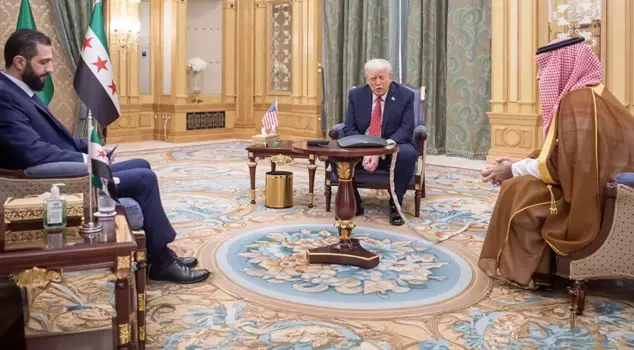
14.05.2025 12:22
U.S. President Donald Trump announced the lifting of years-long sanctions on Syria during the Saudi Arabia-U.S. Investment Forum he attended in Saudi Arabia as part of his Middle East tour. Notably, Trump frequently mentioned Turkey in his statements regarding this issue.
US President Donald Trump addressed the US sanctions on Syria during his speech at the Saudi Arabia-US Investment Forum he attended in Saudi Arabia. He announced that they would lift the sanctions. Trump emphasized in his speech that Turkish President Recep Tayyip Erdoğan and Saudi Crown Prince Mohammed bin Salman had asked him to lift the sanctions on Syria, stating, "Turkey's leader Erdoğan made a similar request recently. My other esteemed friends in the Middle East have said this as well. We will lift the sanctions on Syria," he said.
Trump continued his speech by saying, "I will give the order to lift all sanctions on Syria to give them a chance to rise. Now is their time to shine. We are lifting all of them. Good luck Syria, show us something very special."
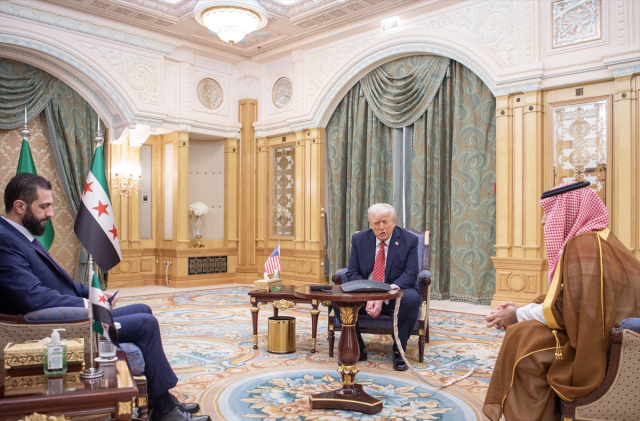
THE IMPACT OF TURKEY IN LIFTING SANCTIONS ON SYRIA
Although the summit held in Riyadh, which brought together Erdoğan, Trump, Shara, and Salman, appears to be owned by Saudi Arabia, behind it is the Republic of Turkey, which has been fighting for Syria to come to the forefront of international diplomacy for a long time. The sanctions were lifted during the meeting, which President Erdoğan also attended via video conference.
TRUMP: "I SPOKE WITH MY FRIEND FROM TURKEY"
US President Donald Trump stated in his speech in Riyadh that he spoke with President Erdoğan, saying, "I just spoke with my friend from Turkey. I think he will give Syria a great chance. We will lift all sanctions on Syria. This will really be very good. My decision to lift the sanctions received great applause."
Following Trump's announcement regarding lifting sanctions on Syria, thousands of Syrians, who were filled with great joy, filled the squares in major cities such as Damascus, Daraa, Hama, Latakia, Idlib, Aleppo, and Homs. The address of the celebrations in Damascus was Umayyad Square. Fireworks were also displayed during the celebrations in the capital.
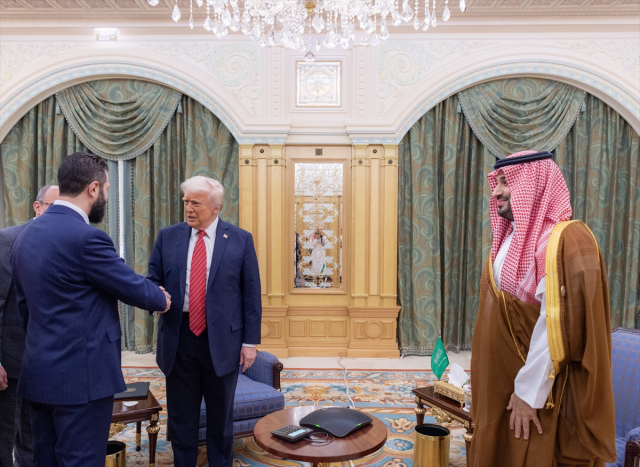
TRUMP HAD DRAWN ATTENTION TO TURKEY
Before his Middle East tour, the day before, while answering journalists' questions in the Oval Office, the US President stated that Erdoğan had asked to lift the sanctions on Syria, saying, "We are also working with President Erdoğan on Syria. Many people have asked me this because the sanctions we impose on them (Syria) really do not provide much of a chance for a new beginning. Therefore, we will make this decision. We can lift the sanctions from Syria because we want to give them a new opportunity."
After these developments, which almost coincided with Trump's presidency, the question of what the US's policy towards Syria would be was a matter of curiosity. The developments provided significant support for the Syrian people, who ended the Assad family's 54-year rule in December 2024.
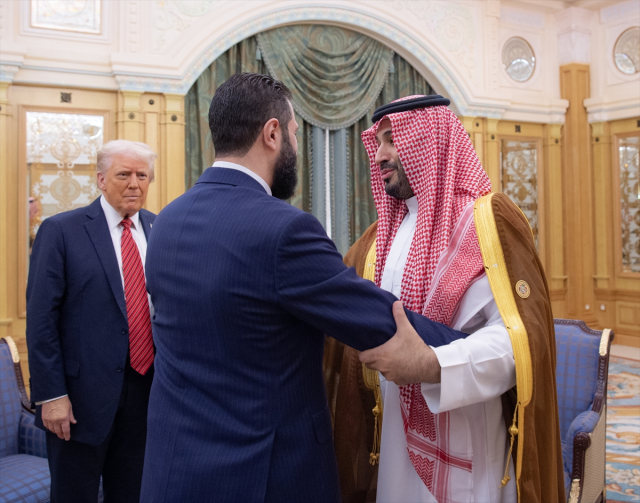
WHAT WAS THE SITUATION BEFORE THE SANCTIONS?
Syria, which has been completely devastated due to a 13-year civil war, needs reconstruction and external financing for this. Lifting the sanctions is vital to enable the flow of international capital from Gulf countries, other Arab countries, and aid organizations.
In January 2025, the European Union (EU) also decided to relax some of the sanctions imposed on Syria for 14 years. It was announced that initially, sanctions in the energy, aviation, and finance sectors would be relaxed.
Contrary to popular belief, the US sanctions on Syria did not start in 2011 but began in 2004 and even in 1979. Information on the official website of the US Department of State states: Syria has been designated as a State Sponsor of Terrorism since December 1979. Additional sanctions and restrictions were imposed with the issuance of Executive Order 13338, which implemented the Syria Accountability and Lebanese Sovereignty Restoration Act (SAA) in May 2004 and imposed additional measures under the International Emergency Economic Powers Act (IEEPA) (50 USC 1701 et seq.).
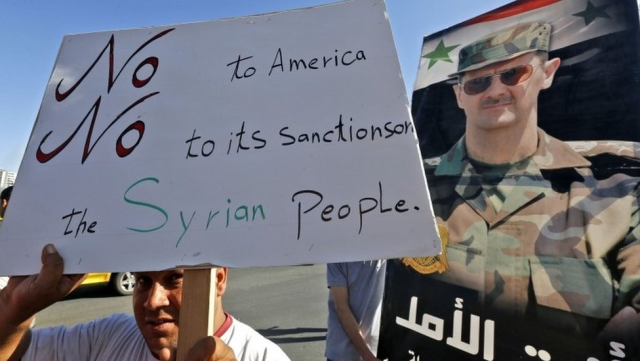
Since the uprisings began in March 2011, the US government has implemented heavily calibrated sanctions aimed at depriving the regime of the resources it needs to continue its violence against civilians and pressuring the Syrian regime to allow a democratic transition demanded by the Syrian people. The first step was taken with Executive Order 13572 in April 2011, which blocked the assets of Syrian officials and others responsible for human rights violations, including those related to repression.
SANCTIONS WERE TIGHTENED DURING THE ASSAD ERA
The US Government took additional steps through Executive Order 13573 in May 2011, related to the Syrian Government's continued escalation of violence against the Syrian people. This Executive Order blocks the assets of any additional Syrian officials (including President Bashar al-Assad) identified as senior officials of the Syrian Government, in consultation with the Department of the Treasury and the Department of State, among other criteria.
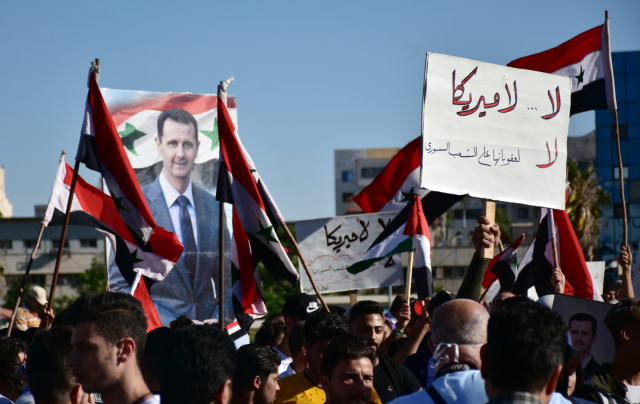
In August 2011, in response to the violence and repression exercised by the Syrian regime in the region, the President issued Executive Order 13582, which blocked the assets of the Syrian Government, provided additional authorities to identify individuals and entities, prohibited new investments by US citizens in Syria, prohibited the export or sale of services to Syria by US citizens, banned the import of Syrian-origin oil or petroleum products, and prohibited US citizens from participating in transactions related to Syrian oil or petroleum products.
```html
HERE IS A SUMMARY OF THE SANCTIONS IMPOSED ON SYRIA OVER THE YEARS
- The first sanction was imposed by the United States, citing Syria's support for terrorist organizations; it was stated that Syria allowed groups like HAMAS and the Palestinian Islamic Jihad Organization to establish bases in the country. As a result, Syria was considered one of the states supporting terrorism.
- The second sanction was imposed by the European Economic Community. The reason for the sanction was involvement in placing a bomb on a plane departing from London. Due to this reason, a partial trade sanction and an arms embargo were implemented. The sanction was imposed in 1986 and lifted in 1994.
- In 2011, Canada imposed a partial trade embargo, and travel between the two countries was restricted.
- After the civil war, the European Union imposed sanctions on the Syrian oil sector. In addition, the assets of Syrian officials in Europe were frozen, and an arms embargo was placed. Although entry to European Union member countries was initially banned for some Syrian officials, the ban was later relaxed.
- In 2011, the United States imposed personal sanctions on President Assad and designated Syrian officials, freezing their assets, and the spokesperson for the U.S. Department of State stated that Assad should resign or lead a change of power.
- Sanctions were imposed by the Arab League in response to the government's repressive policies against citizens' actions.
```